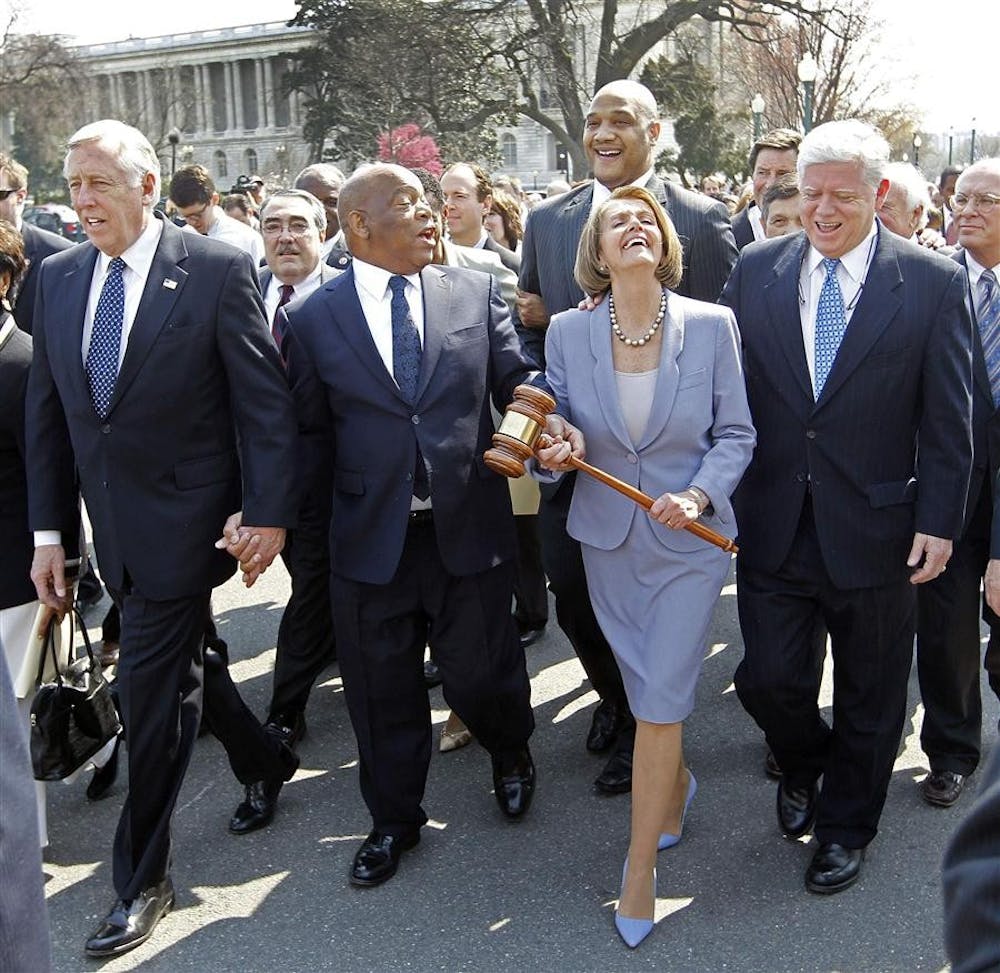WASHINGTON — Summoned to success by President Barack Obama, the Democratic-controlled Congress approved historic legislation Sunday night extending health care to tens of millions of uninsured Americans and cracking down on insurance company abuses, a climactic chapter in the century-long quest for near universal coverage.
Widely viewed as dead two months ago, the Senate-passed bill cleared the House on a 219-212 vote. Republicans were unanimous in opposition, joined by 34 dissident Democrats. Indiana representatives voted along party lines, with all five Democrats in support and all four Republicans against the bill.
Obama watched the vote in the White House’s Roosevelt Room with Vice President Joe Biden and about 40 staff aides. When the long sought 216th vote came in — the magic number needed for passage — the room burst into applause and hugs. An exultant president exchanged a high-five with his chief of staff, Rahm Emanuel.
“We proved that we are still a people capable of doing big things,” the president said a short while later in televised remarks. “We proved that this government — a government of the people and by the people — still works for the people.
A second, smaller measure — making changes in the first — was lined up for passage later in the evening. It would then go to the Senate, where Democratic leaders said they had the votes to pass it.
The nonpartisan Congressional Budget Office said the legislation awaiting the president’s approval would extend coverage to 32 million Americans who lack it, ban insurers from denying coverage on the basis of pre-existing medical conditions and cut deficits by an estimated $138 billion over a decade. If realized, the expansion of coverage would include 95 percent of all eligible individuals under age 65.
For the first time, most Americans would be required to purchase insurance, and face penalties if they refused. Much of the money in the bill would be devoted to subsidies to help families at incomes of up to $88,000 a year pay their premiums.
Far beyond the political ramifications — a concern the president repeatedly insisted he paid no mind — were the sweeping changes the bill held in store for millions of individuals, the insurance companies that would come under tougher control and the health care providers, many of whom would face higher taxes.
Crowds of protesters outside the Capitol shouted “just vote no” in a futile attempt to stop the inevitable taking place inside a House packed with lawmakers and ringed with spectators in the galleries above.
Across hours of debate, House Democrats predicted the larger of the two bills, costing $940 billion over a decade, would rank with other great social legislation of recent decades.
“We will be joining those who established Social Security, Medicare and now, tonight, health care for all Americans,” said Speaker Nancy Pelosi, partner to Obama and Senate Majority Leader Harry Reid, D-Nev., in the grueling campaign to pass the legislation.
“This is the civil rights act of the 21st century,” added Rep. Jim Clyburn of South Carolina, the top-ranking black member of the House.
Republicans readily agreed the bill would affect everyone in America, but warned repeatedly of the burden imposed by more than $900 billion in tax increases and Medicare cuts combined.
“We have failed to listen to America,” said Rep. John Boehner of Ohio, leader of a party that has vowed to carry the fight into the fall’s midterm elections for control of Congress.
The measure would also usher in a significant expansion of Medicaid, the federal-state health care program for the poor. Coverage would be required for incomes up to 133 percent of the federal poverty level, $29,327 a year for a family of four. Childless adults would be covered for the first time, starting in 2014.
The insurance industry, which spent millions on advertising trying to block the bill, would come under new federal regulation. It would be forbidden from placing lifetime dollar limits on policies, denying coverage to children because of pre-existing conditions and canceling policies when a policyholder becomes ill.
Parents would be able to keep children up to age 26 on their family insurance plans, three years longer than is now the case.
The final obstacle to passage was cleared a few hours before the vote, when Obama and Democratic leaders reached a compromise with anti-abortion lawmakers whose rebellion had left the outcome in doubt.
The president issued an executive order pledging that no federal funds would be used for elective abortion.
After months of political gridlock, health care reform passes

Get stories like this in your inbox
Subscribe





